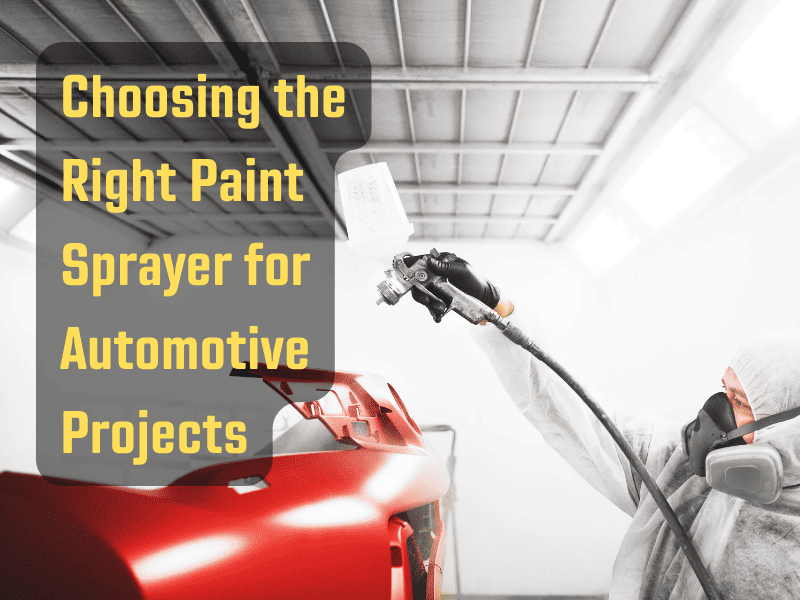When it comes to painting cars, achieving a smooth and flawless finish is of utmost importance. While traditional methods like brushes and rollers can be used for smaller touch-ups, a paint sprayer is preferred for larger automotive projects. This article will explore the different types of paint sprayers used for painting cars, their advantages, and considerations to help you choose the right one for your automotive painting needs.
HVLP Paint Sprayers
HVLP stands for High Volume, Low Pressure, and HVLP paint sprayers are widely used in the automotive industry. These sprayers are designed to deliver a high volume of paint at low pressure, resulting in reduced overspray and better control over the application. Here are some key benefits of HVLP paint sprayers:
- Efficiency: HVLP sprayers efficiently atomize paint, ensuring a fine and even coating on the surface of the car. This efficiency not only saves paint but also reduces the overall painting time.
- Control: The low pressure of HVLP sprayers allows for greater control over the paint flow, enabling precise application even in intricate areas. This level of control helps achieve professional-looking results.
- Reduced Overspray: HVLP sprayers produce a soft spray pattern, minimizing overspray and waste. This saves paint and reduces the amount of cleanup required after painting.
- Environmental Considerations: HVLP sprayers are known for their high transfer efficiency, meaning a greater percentage of paint reaches the painted surface. This reduces the amount of paint particles released into the air, making HVLP sprayers a more environmentally friendly option.
- Versatility: HVLP sprayers can be used with a wide range of coatings, including primer, basecoat, clearcoat, and even specialty automotive finishes. This versatility makes them suitable for various automotive painting tasks.
Airless Paint Sprayers
While HVLP sprayers are commonly used for automotive painting, airless paint sprayers are also an option worth considering. Unlike HVLP sprayers, which rely on low-pressure airflow to atomize paint, airless sprayers use high pressure to force paint through a small opening, creating a fine spray. Here are some advantages of airless paint sprayers:
- Speed: Airless sprayers can cover larger areas quickly, making them ideal for painting cars with large surfaces. The high-pressure application allows for faster completion of automotive painting projects.
- Uniform Coverage: Airless sprayers produce a consistent spray pattern, ensuring uniform coverage across the entire surface. This is especially beneficial when applying primer or basecoat to a car.
- Compatibility with Thick Coatings: Airless sprayers excel at handling thick coatings, such as high-build primers and textured finishes. If your automotive project requires these types of coatings, an airless sprayer may be the better choice.
- Ease of Use: Airless sprayers are relatively easy to use and require minimal setup. This makes them suitable for both professionals and DIY enthusiasts who want to tackle their automotive painting projects.
- Larger Capacity: Airless sprayers typically have larger paint containers, allowing for extended painting sessions without the need for frequent refills. This can be advantageous when working on larger vehicles or multiple cars at once.
While airless sprayers offer their own set of advantages, they do come with a few considerations. The high-pressure application can result in more overspray compared to HVLP sprayers, which may require additional masking and protection. Additionally, the lack of low-pressure airflow in airless sprayers can lead to a higher chance of paint drying in mid-air, potentially causing a rougher finish if not handled properly.
Considerations for Choosing the Right Paint Sprayer
Selecting the right paint sprayer for your automotive painting projects involves considering various factors. Here are some key considerations to keep in mind:
- Project Scale: Assess the size and scope of your automotive painting project. A smaller HVLP sprayer may be sufficient for smaller touch-ups and detail work. However, an airless sprayer’s speed and capacity may be more suitable for larger projects, such as painting an entire car or multiple vehicles.
- Coating Compatibility: Determine the type of coatings you will be using. Both HVLP and airless sprayers are compatible with most automotive coatings, but certain specialized finishes may require specific sprayer models. Consult the manufacturer’s recommendations for compatibility information.
- Skill Level: Consider your level of experience and comfort with paint sprayers. HVLP sprayers are generally more forgiving and easier to control, making them suitable for beginners or those new to automotive painting. Airless sprayers require more skill and practice to achieve optimal results.
- Budget: Set a budget for your paint sprayer purchase. HVLP sprayers are generally more affordable compared to airless sprayers, making them a cost-effective choice for many automotive enthusiasts.
- Maintenance and Cleanup: Understand the maintenance requirements and cleanup procedures for the paint sprayer you choose. Some sprayers may require more thorough cleaning and maintenance, while others may have simpler upkeep routines.
In conclusion, using a paint sprayer is the preferred method for achieving a professional and flawless finish when it comes to painting cars. HVLP sprayers offer efficiency, control, and reduced overspray, making them popular for automotive projects. On the other hand, airless sprayers provide speed, uniform coverage, and compatibility with thicker coatings. By considering factors such as project scale, coating compatibility, skill level, budget, and maintenance requirements, you can choose the right paint sprayer for your specific automotive painting needs. So, get ready to transform your car with a smooth and beautiful paint job using the right paint sprayer!
